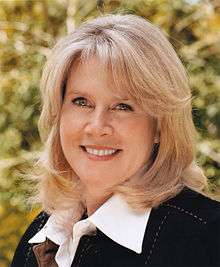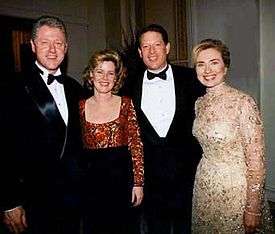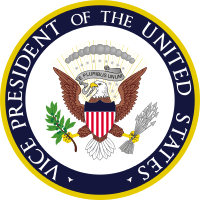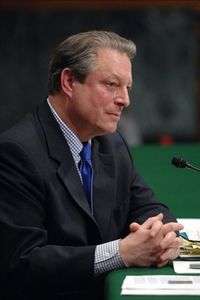Tipper Gore
| Tipper Gore | |
|---|---|
 | |
| Second Lady of the United States | |
|
In office January 20, 1993 – January 20, 2001 | |
| President | Bill Clinton |
| Preceded by | Marilyn Quayle |
| Succeeded by | Lynne Cheney |
| Personal details | |
| Born |
Mary Elizabeth Aitcheson August 19, 1948 Washington, D.C., U.S. |
| Political party | Democratic |
| Spouse(s) | Al Gore (1970–present; separated 2010)[1] |
| Children | 4 (including Karenna, Kristin) |
| Residence | Santa Barbara, California |
| Alma mater |
Garland Junior College |
Mary Elizabeth "Tipper" Gore (née Aitcheson; born August 19, 1948) is an author, photographer, and social issues advocate who was Second Lady of the United States from 1993 to 2001, and the wife of Al Gore, the 45th Vice President of the United States, from whom she is currently separated.
Gore rose to prominence for her work with the Parents Music Resource Center (PMRC), voicing strong opinions and advocating censorship, for the labeling of record covers of releases featuring profane language, especially in the heavy metal, punk and hip hop genres.[2] She has advocated for mental health, homelessness, women and children. Gore has also been an LGBT rights activist since her husband was in office, which was rare for a second lady and against her husband's beliefs at the time.
Early life
Born Mary Elizabeth Aitcheson in Washington, D.C., Tipper Gore is the daughter of John Kenneth "Jack" Aitcheson, Jr., a plumbing-supply entrepreneur and owner of J & H Aitcheson Plumbing Supply,[3] and his first wife, Margaret Ann (née Carlson) Odom (who lost her first husband during World War II). She was given the nickname "Tipper" by her mother, allegedly from a song her mother had heard. Gore grew up in Arlington, Virginia. Her mother and grandmother raised her after her parents divorced.[4]

She attended St. Agnes (now St. Stephen's & St. Agnes School), a private Episcopal school in Alexandria, Virginia, where she played basketball, softball, and field hockey and played the drums for an all-girl band, The Wildcats.[4]
She met Al Gore at his senior prom in 1965. Although she came to the prom with one of his classmates, Gore and Tipper began to date immediately afterwards.[5] When Al Gore began attending Harvard University, she enrolled in Garland Junior College (now part of Simmons College) and later transferred to Boston University, receiving her B.A. in psychology in 1970.[6][7] On May 19, 1970, she and Gore were married at the Washington National Cathedral.[8][9]
Gore pursued a master's degree in psychology from Vanderbilt University's George Peabody College, graduating in 1975.[10][11]
Career
Gore worked part-time as a newspaper photographer for Nashville's The Tennessean and continued as a freelance photographer in Washington after her husband was elected to the U.S. Congress in 1976.[4][11][12]
Politics and activism

Gore took an active role in her husband’s political pursuits starting with his first campaign for the United States House of Representatives from Tennessee in 1976.[13] Soon after her husband's election, Gore established a group to examine and write about social issues called the Congressional Wives Task Force.[14][15]
In 1984, Gore began volunteering in homeless shelters.[4][16] Homelessness became a major cause for Gore, and she formed a group called Families for the Homeless to raise funds and awareness for the issue.[4][17]
Parents Music Resource Center (PMRC)
In 1985, Tipper Gore co-founded the Parents Music Resource Center (PMRC) with Susan Baker, wife of then United States Secretary of the Treasury James Baker, because Tipper heard her then 11-year-old daughter Karenna playing "Darling Nikki" by Prince.[18] The group's goal was to increase parental and consumer awareness of music that contained explicit content through voluntary labeling albums with Parental Advisory stickers.[4][19] Their coalition included the National PTA and the American Academy of Pediatrics.[19]
According to an article by NPR, Gore went "before Congress to urge warning labels for records marketed to children."[20] Gore explained that her purpose wasn't to put a "gag" on music, but to keep it safe for younger listeners by providing parents with information about the content of the songs.[20] A number of individuals including Dee Snider of Twisted Sister,[21] Jello Biafra of the Dead Kennedys,[22] John Denver, Joey Ramone, and Frank Zappa[20] criticized the group, arguing that it was a form of censorship. In response, NPR further stated that according to Gore, she "wasn't out to censor the objectionable material" and quoted her as stating that she is "a strong believer in the First Amendment" who is calling for greater "consumer information in the marketplace."[20]
The PMRC's efforts were successful and resulted in an agreement where recording labels voluntarily placed warning labels on music with violent or sexually explicit lyrics.[4][23]
1990s to present
In 1990, Gore founded the Tennessee Voices for Children to advance youth services for mental health and substance abuse.[24] Gore also co-chaired the National Mental Health Association's Child Mental Health Interest Group.[25]
Gore campaigned during her husband's 1988 presidential bid[26] and toured with him and Bill and Hillary Clinton during the presidential campaign of 1992.[23][27]
As Second Lady, Gore served as Mental Health Policy Advisor to the President.[11] Her goals were to diminish the stigma surrounding mental illness and to bring awareness to the need for affordable mental health care.[16][25] In 1999, Gore hosted the first White House Conference on Mental Health.[16] That same year, she launched the National Mental Health Awareness Campaign (NMHAC) to encourage Americans to seek treatment for mental illness.[28] Gore has frequently spoken about her own experience with depression and treatment following the near-fatal injury of her son Albert.[13][23][29]
Along with her work in mental health, Gore was a part of several other initiatives during her time as Second Lady. She served as Special Advisor to the Interagency Council on the Homeless and as the national spokesperson for the "Back to Sleep" SIDS awareness campaign.[30] In 1994, Gore visited a refugee camp and an orphanage in Zaire on a personal trip to provide aid in the aftermath of the Rwandan Genocide. She stayed in a UNICEF camp and assisted doctors and aid workers.[31][32][33] She made an official visit to Honduras in 1998 following Hurricane Mitch to volunteer, bring medical supplies, and survey the damage.[34][35]
Gore took part in campaigning for the reelection of President Clinton and Vice President Gore in 1996,[36][37] and she was actively involved in her husband's presidential campaign in 2000, making her own campaign stops and media appearances. She also acted as an advisor and was a part of decisions including the hiring of Tony Coelho as chairman of the campaign and moving its headquarters to Nashville.[11][13][23]
In 2002, Gore was urged by her supporters to run for the vacant U.S. Senate seat her husband once held in Tennessee, which was being vacated by Fred Thompson; however, she declined.[38]
Gore has been a long-time advocate for the LGBT community.[23][39] She represented the Clinton Administration in the Washington, DC AIDS Walk in 1993 as one of the highest-ranking public officials ever to participate.[39] She has continued to participate in such walks and, in 2013, she was an honorary chair of the Nashville AIDS Walk & 5K Run.[40] She was a public opponent of California's Proposition 8 to ban same sex marriage in 2008.[41]
She serves as co-chair of the advisory board of the Diana Basehart Foundation which assists homeless and low-income people with animal care.[42] In 2014, she created an exhibition of her photographs at the Wall Space Gallery to support the Pacific Pride Foundation that provides services to the HIV/AIDS and LGBT communities of Santa Barbara, California.[43]
Creative roles


In high school, Gore was the drummer for an all-girl band called the Wildcats.[13][23] She has played drums with members of the Grateful Dead, and during the second night of the Spring 2009 Dead tour, Tipper Gore sat in on drums during the closing song "Sugar Magnolia".[23][44] In 2000, she appeared on stage at the Equality Rocks concert at Robert F. Kennedy Memorial Stadium to play to a crowd of 45,000 prior to the Millennium March on Washington.[23][45] Later that year, she played with Willie Nelson during his set at Farm Aid.[46] She played with Herbie Hancock at the 25th Thelonious Monk International Jazz Competition in 2012.[47]
A photographer since the 1970s, Gore has published several books of photography,[4] has been included in exhibits,[48] and her prints have been sold by Mitchell Gold Co. stores.[49]
Personal life
Gore has four children: Karenna Gore Schiff[50] (born August 6, 1973), Kristin Gore[51] (born June 5, 1977), Sarah LaFon Gore Maiani[51][52] (born January 7, 1979), and Albert Gore III (born October 19, 1982);[53] and several grandchildren.[54]
In June 2010, the Gores announced their marital separation, "a mutual and mutually supportive decision that we have made together following a process of long and careful consideration."[55] In August 2012, The New York Times reported that both Gores were dating other people and have no plans to resume marriage, but that their "bond endures" and their relationship is friendly. "The couple reunites a few times a year, most recently in June, for summer family vacations and Christmases in the Gore family seat of Carthage, Tennessee," the newspaper reported. Tipper has been dating Bill Allen, who is a former editor of National Geographic.[56]
Bibliography
Tipper Gore is the author of a number of books including:
- Raising PG Kids in an X-Rated Society, 1987, ISBN 0-687-35282-7
- Picture This: A Visual Diary, 1996, ISBN 0-553-06720-6
- Joined at the Heart: The Transformation of the American Family, 2002, ISBN 0-8050-7450-3, (with Al Gore)
- The Spirit of Family, 2002, ISBN 5-550-15167-7 (with Al Gore)
She has also contributed to the following books:
- The Way Home: Ending Homelessness in America, 2000, ISBN 0-886-7505-8X
- From the Bottom of Our Hearts, 2002, ISBN 1-931718-32-6 (Foreword)
References
- ↑ Schelzig, Erik (June 1, 2010). "After 40 years of marriage, Tipper and Al Gore part ways". Christian Science Monitor. Associated Press. Retrieved December 30, 2013.
- ↑ "The obscenity trial that made H. R. Giger an icon for punk rock and free speech — Quartz". Qz.com. 2014-05-20. Retrieved 2016-08-22.
- ↑ "John K. Aitcheson (obituary)". The Washington Post. December 30, 2012. Retrieved 5 May 2015.
- 1 2 3 4 5 6 7 8 "Tipper Gore Bio". CNN. Retrieved 20 April 2014.
- ↑ Maraniss, David; Nakashima, Ellen (October 10, 1999). "Al Gore, Growing Up in Two Worlds". The Washington Post. Retrieved 2008-06-22.
- ↑ Next First Lady Will Recast Role - Tipper Gore and Laura Bush
- ↑ "Photo Gallery: Garland Junior College dance". The Washington Post. Retrieved April 20, 2014.
- ↑ "Gore Chronology". PBS. Retrieved 2008-06-16.
- ↑ Howd, Aimee (December 31, 1999). "Wedding photograph". The Washington Post. Retrieved 2008-06-22.
- ↑ "Tipper Gore In and Out of Public Eye". ABC News. January 6, 2006. Retrieved April 20, 2014.
- 1 2 3 4 "Who is Tipper Gore?". CNN. June 16, 1999. Retrieved 6 March 2015.
- ↑ KohrsCampbell, Karlyn. "Shadowboxing with Stereotypes: the Press, the Public, and the Candidates Wives" (PDF). John F. Kennedy School of Government: 5. Retrieved 3 April 2015.
- 1 2 3 4 Davey, Monica (August 17, 2000). "Tipper Gore Vows She Would Chart Own Course As First Lady". Chicago Tribune. Retrieved 12 March 2015.
- ↑ Romano, Lois (March 29, 1988). "Tipper Gore, Playing Down the Rock War". The Washington Post. Retrieved 22 June 2015.
- ↑ Povich, Elaine S. (July 10, 1992). "Tipper Gore Gives Ticket Family-value Points". Chicago Tribune. Retrieved 22 June 2015.
- 1 2 3 O'Connor, Eileen (June 7, 1999). "Longtime mental health advocate Tipper Gore takes centerstage". CNN. Retrieved 13 March 2015.
- ↑ Peterson, Helen (August 13, 2000). "Gore's Tipper: All-American Cheerleader". New York Daily News. Retrieved 17 June 2015.
- ↑ Miss Cellania (2 January 2012). "Tipper vs. Music". Uncle John's Bathroom Reader Plunges into Music. The Bathroom Reader Institute. Retrieved 2 June 2012.
- 1 2 Hinckley, David (July 19, 1987). "Pediatricians Group Agrees To Join In Warnings Against Rock Lyrics". New York Daily News. Retrieved 12 March 2015.
- 1 2 3 4 Siegel, Robert (2005-01-11). "Tipper Gore and Family Values". National Public Radio. Retrieved 2007-09-12.
- ↑ "Dee Snider's Statement on Censorship to the U.S. Senate". VH1. Viacom International Inc. 15 July 2002. Archived from the original on 2007-02-08. Retrieved 2 June 2012.
- ↑ Jello Biafra. "Jello Biafra's Statement for Synthesis/Regeneration magazine". Alternative Tentacles. Alternative Tentacles. Retrieved 2 June 2012.
- 1 2 3 4 5 6 7 8 Seelye, Katharine Q. (May 19, 2000). "The 2000 Campaign: The Vice President's Wife". The New York Times. Retrieved 13 March 2015.
- ↑ Shrieve, Krystn (September 2, 1999). "Ventura County Seeks Help; Tipper Gore May Be Enlisted In Health Services Row". Los Angeles Daily News. Retrieved 17 June 2015.
- 1 2 Cimons, Marlene (March 11, 1993). "Mental Health May Be Part of Reform, Tipper Gore Says". The Los Angeles Times. Retrieved 13 March 2015.
- ↑ Godown, Jan (November 29, 1992). "A few moments with Tipper Gore". Orlando Sentinel. Retrieved 22 April 2015.
- ↑ Ifill, Gwen (July 19, 1992). "The Democrats; Clinton-Gore Caravan Refuels With Spirit From Adoring Crowds". The New York Times. Retrieved 13 March 2015.
- ↑ Morales, Tatiana (May 23, 2002). "Tipper Gore On Mental Health". CBS. Retrieved 13 March 2015.
- ↑ Morgan, John (May 20, 2003). "Tipper Gore honors mental health achievements". USA Today. Retrieved 13 March 2015.
- ↑ "Tipper Gore Joins SIDS fight". The Gainesville Sun. Associated Press. March 21, 1997. Retrieved 22 April 2015.
- ↑ Rieff, David (December 1994). "God and Man in Rwanda". Vanity Fair (magazine). Retrieved 22 April 2015.
- ↑ Warrick, Pamela (August 15, 1994). "Tipper Gore's Mission of Mercy : Rwanda: On a visit to L.A., she recounts tales of life--and death--in refugee camps.". Los Angeles Times. Retrieved 22 April 2015.
- ↑ "VP Wife Tipper Gore Discusses Her Recent Trip To Refugee Camps In Zaire". NBC News. NBCUniversal. August 16, 1994. Retrieved 22 April 2015.
- ↑ "Tipper Gore visits Honduras to assess relief needs from Hurricane Mitch". Lubbock Avalanche-Journal. Associated Press. November 12, 1998. Retrieved 22 April 2015.
- ↑ Testa, Karen (November 11, 1998). "Tipper Gore Visits Honduras". Associated Press. Retrieved 22 April 2015.
- ↑ "Tipper Gore Coming To Spokane Next Week". The Spokesman-Review. February 6, 1996. Retrieved 22 April 2015.
- ↑ Shogren, Elizabeth (November 5, 1996). "Gore Striving to Deliver Neck-and-Neck Tennessee". Los Angeles Times. Retrieved 22 April 2015.
- ↑ Karl, Jonathan; Bash, Dana (17 March 2002). "Tipper Gore says no to Senate bid". CNN. Cable News Network. Turner Broadcasting System, Inc. Archived from the original on 1 October 2012. Retrieved 2 June 2012.
- 1 2 "Ready to Run: 2013 Nashville AIDS Walk takes place October 5". Out and About Nashville. September 23, 2013. Retrieved 13 March 2015.
- ↑ Page, Jamie (October 6, 2013). "Tipper Gore Draws Crowd". The Tennessean. Archived from the original on 20 April 2015. Retrieved 13 March 2015.
- ↑ "Tipper Gore, L.A. Gay and Lesbian Center Dinner Focus on No on 8". The Advocate. October 21, 2008. Retrieved 13 March 2015.
- ↑ Sutton, Justine (December 6, 2012). "Diana Basehart Foundation Makes People and Their Animals Its Pet Project". Noozhawk. Retrieved 9 April 2015.
- ↑ Ortiz, Jennifer (October 1, 2014). "Behind the Lens: The Photography of Tipper Gore at Wall Space Gallery". Seasons Magazine. Retrieved 9 April 2015.
- ↑ Ann, Mary. "The Sleuth - The Dead in D.C., a Stirring, Smoky Bipartisan Show". Voices.washingtonpost.com. Retrieved 2015-01-25.
- ↑ Ocamb, Karen (November 20, 2008). "Tipper Gore Comes Out Against Prop 8". The Huffington Post. Retrieved 25 March 2015.
- ↑ Margolis, Lynne (September 18, 2000). "Young Shines at Farm Aid 2000". ABC News. Retrieved 13 March 2015.
- ↑ "Tipper Gore hits the drums at Monk Institute gala". The Washington Post. September 24, 2012. Retrieved 13 March 2015.
- ↑ "Tipper Gore Says Convention Is No Threat to Homeless". The Los Angeles Times. July 15, 2000. Retrieved 13 March 2015.
- ↑ Schaub, Charlyne Varkonyi (May 5, 2006). "Accents For The Politically Hip". Sun-Sentinel. Retrieved 3 April 2015.
- ↑ Marcano, Tony (1997-03-21). "CHRONICLE". The New York Times. Retrieved 2009-01-06.
- 1 2 Gore, Al (May 22, 2007). The Assault on Reason. New York: Penguin Press. ISBN 1-59420-122-6. Retrieved January 8, 2009.
- ↑ Westfall, Sandra Sobieraj (April 22, 2014). "Sarah Gore, Daughter of Al Gore, Weds in California". People. Retrieved 6 March 2015.
- ↑ "Biography: Gore's road from Tennessee to the White House". CNN. June 16, 1999.
- ↑ McElwaine, Sandra (July 6, 2012). "Bill Allen: Tipper Gore's Secretive New Beau". The Daily Beast. Retrieved 5 May 2015.
- ↑ Argetsinger, Amy; Roberts, Roxanne (2010-06-02). "40 more years? Not for Al and Tipper Gore, who've announced their separation". The Washington Post. Retrieved 2012-11-17.
- ↑ Healy, Patrick (2012-08-25). "The End of the Line". The New York Times. Retrieved 2012-11-17.
External links
| Wikimedia Commons has media related to Tipper Gore. |
- Tipper Gore Photography
- Official White House homepage (archived)
- Early version of official White House homepage, 1994
- Warm and personable wins points with public - Tipper Gore (1996)
- Biography—Frontline
- Biography
- "Tipper Gore and Family Values"—NPR
- Tipper Gore speaks at the Democratic National Convention, 1996
- The Women Who Made Al Gore
| Honorary titles | ||
|---|---|---|
| Preceded by Marilyn Quayle |
Second Lady of the United States 1993–2001 |
Succeeded by Lynne Cheney |
| United States order of precedence (ceremonial) | ||
| Preceded by Al Gore as Former Vice President |
Order of precedence in the United States as Former Second Lady |
Succeeded by Dick Cheney as Former Vice President |

